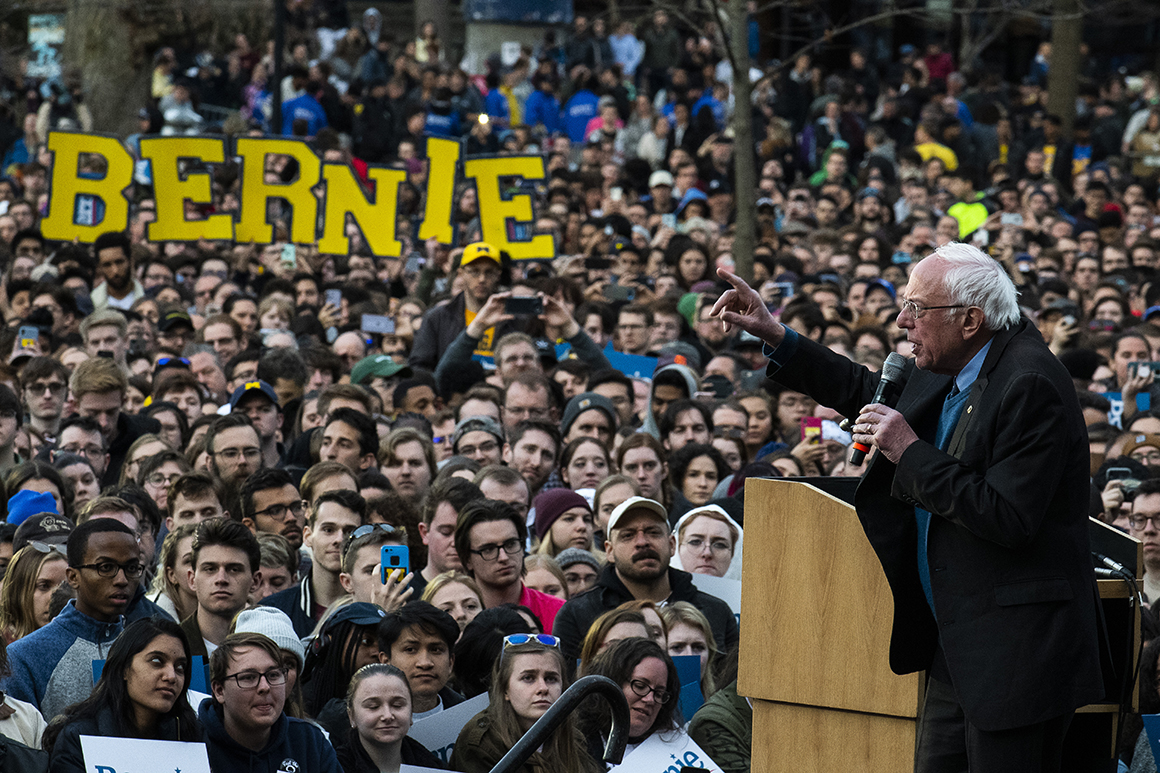
Conflict between senior aides and the organizing operation culminated in February when Sandberg was layered by Misty Rebik, the former Iowa state director who was named the team’s national director of organizing and field.
Even critics of the organizing program concede that the best-run field operation can only move a few points in a close race. But Sanders lost to Biden by double-digits in at least a dozen states.
Many in the campaign partly blame cable TV for that, with the media-tracking service Critical Mention estimating that Biden enjoyed nearly $72 million in almost completely positive earned media in the days between South Carolina and Super Tuesday. But some of Sanders’ aides and allies also think they could have done a better job handling the press.
They think the campaign should have had more surrogates on MSNBC and other cable news channels. Staffers were also told at times not to pitch opposition research on rivals — a standard job for the communications shop on most campaigns — due to the fact that Sanders disliked negative campaigning. And Sanders sometimes rebuffed the press: According to an MSNBC spokesperson, the network had a longstanding invitation for Sanders to participate in a town hall, but he declined.
Some of Sanders’ allies felt he should have brought on longtime professionals who knew and could better deal with the mainstream media.
“He needed to hire somebody who could talk to the corporate media and could call in favors,” said a surrogate.
Sanders’ team zeroed in on the liberal network MSNBC early on in the campaign as a particular problem. Even more than CNN or Fox News, his aides felt that its pundits were extremely negative and unfair toward Sanders. Over the summer, Sanders and his top brass sat down with network president Phil Griffin in what MSNBC described as an off-the-record editorial board meeting.
“I thought we walked out of there without a good common understanding,” said Shakir. “My big point to them was this is Bernie Sanders, the human being. This is not the angry, yelling, finger-up-in-the-air Bernie Sanders as you guys often portray. Here he is, the human being. Talk to him.”
But any optimism was short-lived. “It just didn’t feel like it ever fundamentally changed,” said Shakir. “We tried that approach. Didn’t change.”
Mike Casca, an experienced operative who had worked for Bill de Blasio and Sanders in 2016, was brought onboard in September as the communications director to improve the operation, and he became a respected figure among the press corps that covered Sanders.
In August, Sanders’ campaign also talked with his former TV ad firm, Devine Mulvey Longabaugh, about returning. In addition to being behind the famous 2016 spot “America,” the business had served as a link between the Sanders movement and more mainstream Democrats and the press. But an aide said Sanders balked at what he saw as too steep a price, leading him to believe that the firm was more concerned with money than the cause.
“It was Bernie’s campaign that reached back out to us,” said Mark Longabaugh, a partner at the business. “We put a pretty standard contract on the table. It was not out of bounds in any way. It was in fact a smaller commission than we actually received in ’16.”
Despite the campaign’s attempts to deal with MSNBC, the network’s hosts and pundits blasted Sanders the day he won the Nevada caucuses — the type of campaign development that might have resulted in other candidates winning a slew of positive media. Chris Matthews compared Sanders’ victory in the caucuses to the Nazi invasion of France. James Carville said a Sanders nomination would be political suicide, and that Russia President Vladimir Putin was “the happiest person right now” about the news.
“The media between Nevada and Super Tuesday was more negative than anybody could have ever anticipated,“ said Jane Sanders. „That’s something I hope the media would look at.“
Shakir contacted Griffin after the show and demanded an apology for Matthews’ remarks, which Sanders was deeply offended by as a Jewish man whose family members died in the Holocaust. Matthews admitted on air it was a mistake and later parted ways with MSNBC on the eve of Super Tuesday.
But by then, the damage had been done.
Source: politico.com
See more here: news365.stream






